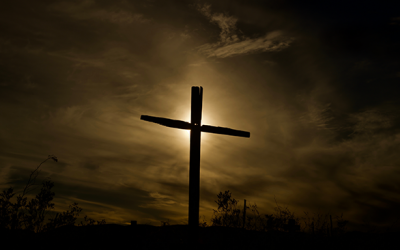How’s your “crazy-meter?” The frenzy is at an all time high in our society. COVID and the 2020 Election has a lot of people amped up pretty well. So, can I share two thoughts on guarding your heart and keeping your perspective during this next week?
Here are two simple thoughts that help me participate in a broken process without going crazy…
First, I Remember I’m a Citizen of Two Kingdoms
First, I’m a citizen of Heaven, based upon the finished, atoning work of Jesus. I’m a child of God, in the family of God, heir of the riches of Heaven, and eternally adopted into His love and grace. This is what is most true and durable about me. This is my highest and most enduring definition.
Second, I’m a citizen of the United States of America. This citizenship is far lesser in significance. It’s temporal. It’s earthly. It’s fragile. But I’m deeply grateful for it. This citizenship was hard won by the sacrifice of many. This citizenship allows me the freedom to follow Jesus and preach His gospel.
What do these two citizenships produce?
Dual Citizenship Produces Tension
The tension between these two citizenships is real during election seasons. The greater citizenship calls me to righteous living to honor and please Jesus. The lesser citizenship calls me to participate in a temporary process of choosing broken political leaders and insufficient policies in an imperfect system. I am called to vote for one of two radically imperfect governance philosophies. Every election essentially pins me between two deeply flawed platform options and two deeply flawed personalities we call “candidates.”
No wonder there are so many loud and strong opinions on voting and how to (or not to) participate.
Yes, I have always participated in voting. Yes, I will again. Outside of the last two centuries in America, few generations of Christians have ever had the privilege to actually participate in choosing their own system of civil governance. As flawed as the process is, I’m thankful for this one way (of many) that I can engage in actively being “salt and light” in my society.
Don’t be surprised by the tension you feel as a believer. You have two citizenships, and in many ways they conflict. But the greater citizenship does not require you to piously withdraw from the lesser.
Dual Citizenship Safeguards Hope
This is the huge upside to dual citizenships. The greater citizenship safeguards our hope when the lesser fails us. We are held by the greater. We are defined by the greater. We are safe, secure, guaranteed by the greater. The lesser is temporal, and the process is short-lived. Yes, sad to say, four years from now we will be right back in this exact same place. Even if “your guy” wins, it’s only for four years.
But in our true, highest citizenship, our King already won forever! Jesus defeated the greatest enemies—sin and death. He is King of all kings forever. So, regardless of what happens in the 2020 election, our true hope is unassailable.
Dual Citizenship Holds Our True Identity
Our citizenship in Heaven is what most deeply defines us. This prevents us from being defined by our politics and from allowing our hearts to define others by their politics. A strong identity in Jesus will compel us to see others as valuable, beloved souls—brothers and sisters in the same family (regardless of temporal political views) or as lost souls who need the same Savior we have found.
The greater citizenship compels us to see others—believers and unbelievers—through an eternal lens, not a political one.
Second, I Remember that I’m Voting for Policies Not People
I am told by my society that I am voting for a person. But, I’ve never been presented with a candidate who fully met my expectations or ideals. Because of this, I’ve never felt that I was voting for a person. The person always fails to measure up personally. Every candidate is broken, sinful, and often unbelieving.
When it’s all about the “person,” the conversation unavoidably digresses into a shouting match between pharisees, each side decrying the sins of the other. It’s a distraction from what we’re really voting for—a platform of policies and a coalition of many people who promise to (imperfectly) work to implement those policies.
Do I ignore the personal morals of leaders? Of course not. It even bothers me to hear a national leader use a curse word. But in my lifetime, I’ve never been given the option of an extremely moral national leader. Yet I have been given the options of policies and platforms—some of which are more reflective of biblical values and God’s nature, and some of which are less so. Often, both platforms have been considerably distant from actual biblical models, but generally there is one closer and one farther away.
In the chaotic cyclone of daily rhetoric, campaign ads, rage, and distortion, it is easy to lose sight of the actual policies in play. Presently, there are very different policy agendas at war, and it doesn’t take a lot of discernment to see which “bundle of policies” most respect (from a governance perspective) the principles of God’s word—even though those policies are insufficient and the people implementing them may or may not have any regard for God or His word.
It’s complicated isn’t it?!
Here’s my simple perspective—when I look at the people, I feel a conflict of soul. With every candidate in my lifetime, there are things I approve and things I disapprove. Frankly, the same thing happens when I look in the mirror! But when I look at the policies, the emotional fog clears and the decision becomes clearer and simpler, especially in light of my higher citizenship.
I deeply value policies that value things like: life in the womb, originalist judges, religious freedom, the reality of God, personal responsibility, and the liberty guaranteed in our Constitution (especially during a pandemic when so many liberties are being unilaterally removed).
In summary…
A single, short-term vote in a temporal, flawed, man-made system is not an act of worship, unless I make it so. Many do. I refuse to. To vote is not to place my hope or my identity into a person or a party. It is not to wholly and blindly endorse a person or that person’s behavior or history. Not at all.
To vote is to participate in a process of choosing policies and a large coalition of people who will seek to deploy those policies.
Because of this, I don’t vote for “who I like”—I vote for policies that would appear to most value my highest citizenship.
Let your highest citizenship hold your deepest hope. Let it keep you from defining yourself or others by their politics. And don’t be surprised by the soul-tension this dual citizenship creates within you during the human political process.
Vote for policies not persons. What platform seems to most release us to live out our highest citizenship? Those are the policies I will always vote for, regardless of the face on the poster.
Perhaps most importantly, refuse to let this season make you crazy. Our society needs believers to keep their heads on, their hearts soft, and their words ready to speak hope to those who desperately need it. Be nice. Be grounded. Be active in the process but not hoping in it.
We will know our hope is resting firmly in Jesus when the outcome of the election (either way) is merely incidental to our true joy and hope, and not strongly influential over our emotions. If “your team” loses—will you lose joy and hope? If “your team” wins—will your joy and hope increase? Either way, it’s a set up for disappointment—either now or four years from now.
So exercise your right to vote (in your lesser citizenship) as you rest firmly in your higher citizenship. Vote for policies not people.
Because of Jesus—whatever happens on November 3, or 4, or 5—you will be just fine.




